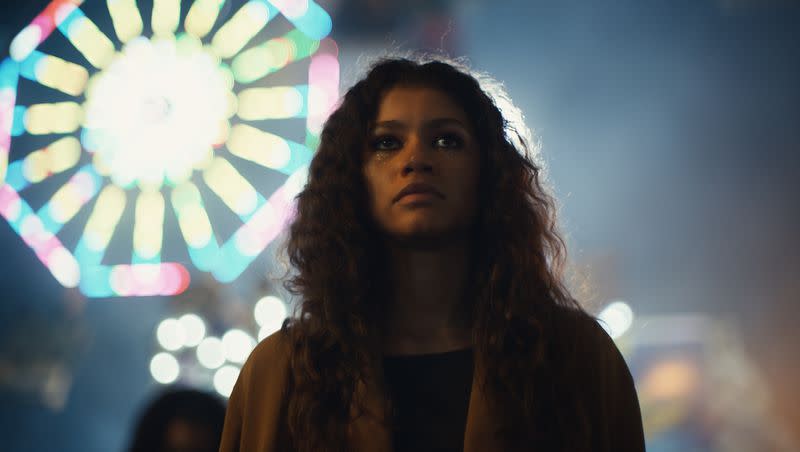How ‘The Idol’ and ‘Euphoria’ show why we should still care about toxic material in adult shows

- Oops!Something went wrong.Please try again later.
- Oops!Something went wrong.Please try again later.
After seeing clips of “Euphoria” and “The Idol” circulate on TikTok, I assumed the shows would be similar to “Gossip Girl” or “Pretty Little Liars.”
I was wrong.
These HBO dramas, directed by Sam Levinson, are rated TV-MA — but that doesn’t tell the whole story. TV-MA can encapsulate everything from a thrilling film like “Reality” (some profanity, but a relatively clean movie otherwise) to “The Idol” and “Euphoria,” which both feature graphic sex scenes, teen drug use, relationship violence and abuse — and in the case of “The Idol,” even torture.
The two series capitalize on the shock value of the explicit content — a quasi substitution for well-developed dialogue and thoughtful exploration around real world issues.
Even though the shows are rated TV-MA and for adults, clips are circulating on social media, and it’s possible children will be able to access these shows. (When setting up your kids’ profile for the streaming service Max, make sure to toggle the option to set a code to switch back to the adult profile.)
Here’s a quick look at what should parents know about these two HBO dramas.
Drug use and unhealthy relationships in ‘Euphoria’
“The main character Rue in ‘Euphoria’ is a drug addict, and they show her consuming drugs. So in that respect, it almost acts like a tutorial on how to use drugs,” Melissa Henson, vice president of programs at the Parents Television and Media Council, said to Deseret News.
There’s also an episode showing Rue (played by Zendaya) figuring out how to pass a drug test while she’s on drugs.
Levinson told Entertainment Weekly he became involved in the show when he told HBO’s head of drama how he was addicted to drugs and then became clean.
“‘Euphoria,’ chooses to misguidedly glorify and erroneously depict high school student drug use, addiction, anonymous sex, violence and other destructive behaviors as common and widespread in today’s world,” the Drug Abuse Resistance Education program (also known as D.A.R.E.) said in a statement, per NBC News.
In response to D.A.R.E.’s statement, Zendaya said to Entertainment Weekly, “Our show is in no way a moral tale to teach people how to live their life or what they should be doing.”
The relationship dynamics in the series are also concerning to Henson — she said there’s not a healthy relationship anywhere in the show. Unhealthy relationship dynamics are modeled as normative, according to Henson.
For example, there’s a scene in the first episode between two characters, Cassie and McKay, where McKay chokes Cassie during sex and she tells him to stop. Shortly after, the two start dating, which Henson described as one of the “unhealthy dynamics” in relationships.
Why media outlets have critiqued ‘The Idol’
“The Idol” follows a pop star played by Lily-Rose Depp whose tour was canceled because of a nervous breakdown. She becomes involved with a nightclub owner named Tedros, played by The Weeknd, also known as Abel Makkonen Tesfaye.
“It’s dark, it’s twisted, it’s exploitative,” Henson said. “There’s nothing positive in the messaging, no hope, no redemption.”
“We always knew that we were going to make something that was going to be provocative and perhaps not for everyone. That was a draw for all of us,” Depp told The New York Times. “I don’t think any of us were interested in making anything that was going to be, you know, fun for the whole family.”
A viewer quoted by the New York Post said a scene from “The Idol” was “pornographic,” per PTC. Nicole Dominique wrote in Evie Magazine, “... the series did nothing but deliver disturbing content full of sex and violence that serves no purpose other than to shock the audience.”
The first season of the show ended one episode earlier than expected. In the finale — after Tedros exhibits manipulative behavior towards Jocelyn throughout the series and he’s revealed to have been a pimp — ultimately, Jocelyn welcomes Tedros back. The finale hints Jocelyn may have manipulated Tedros. Despite the pair’s toxic relationship, they end up reunited.
“We cannot allow this to become sort of normative to kids where this informs their expectations about what a relationship looks like, because these are not healthy,” Henson said. “There is not a single example of a healthy, romantic relationship in either series.”

